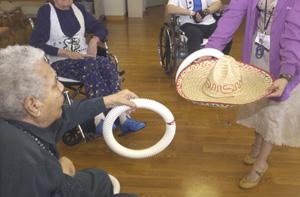|
Nursing Homes Learn Clients' Cultural Needs
By Jane M. Von Bergen, Philadelphia Inquirer
May
15, 2006

Scott s. Hamrick / inquirer
Speaking their language
Anzhela Kogan, a licensed practical nurse who was a physician in Ukraine, knows something about her elderly patients that Scott J. Centak, the director of the Somerton Center nursing home, didn't - or at least not until recently.
Many of the Russian and Ukrainian immigrants who live in his Northeast Philadelphia nursing home equate good medical care with getting shots, not with taking pills.
"That could be a regulatory nightmare," said Centak, picturing his residents answering nyet to an inspector asking them whether they were getting their medicine.
"They are used to shots," Kogan said.
For Centak, that crucial yet subtle cultural nuance is part of the nexus between good patient care and marketing.
Even as the population ages, nursing homes find themselves in ever-tougher competition with assisted-living facilities and home-based programs. One way they are competing is by reaching out to various ethnic groups.
Centak is fortunate to have a sizable Russian and Ukrainian staff who can translate not just words, but cultural differences, too. Kogan, for example, can tell Somerton's residents, in their native language, that good medicine also comes in pills.
Somerton's multilingual staff is a marketing plus for Genesis HealthCare Corp., of Kennett Square, the publicly traded nursing-home company that owns the center.
Knowing that thousands of Russian immigrants live nearby, administrators are nearly doubling the center's Russian wing from 50 to 94 beds. They hope families will want their loved ones to be able to explain their symptoms to someone who understands - and to spend a pleasant afternoon making pirozhki and Russian waffle cake.
That ties in to a growing movement to make nursing homes less like hospitals and more like homes.
"Nationally, there is a movement to keep people in their homes as long as they can and then offer options for institutional care," said Paul Langevin, president of the Health Care Association of New Jersey, a trade group for nursing homes.
These new options may be advantageous for the elderly, but they have hit nursing homes hard.
"We now have 2,000 empty nursing-home beds in New Jersey," Langevin said. Nursing homes increasingly care for the oldest, the most frail, and, therefore, the most expensive to care for.
Many long-term residents no longer have the acute medical crises that would qualify them for reimbursement through Medicare, the federally funded health-insurance program for people 65 and older.
Instead, many residents cover the cost themselves, either through insurance or out of pocket. Those who can't pay themselves rely on Medicaid, another government-funded program, which does not completely cover daily costs.
Nursing homes lose $17 a day on Medicaid patients, Langevin said.
To survive, nursing homes need to attract a mix that includes short-term Medicare-covered patients - perhaps someone recovering from a broken hip.
At Genesis' 210 nursing homes, mostly on the East Coast, 30 percent of residents are short-term, staying for an average of 23 days.
Marketing plays a growing role in attracting that patient mix. Some of Genesis' facilities market medical specialties such as ventilator care or dialysis treatment, spokeswoman Lisa Salamon said.
But a handful also reach out to ethnic groups. Genesis' Cooper River West in Pennsauken distributes a glossy leaflet in Spanish at nearby churches:
"Bienvenidos. Nuestra Casa Es Su Casa. Welcome. Our Home Is Your Home."
This approach will be key - to both patient care and marketing - as the nation's elderly population becomes more diverse, said Allen Glicksman, chief sociologist at the Philadelphia Corporation for Aging and an author of a January report titled "Looking Ahead: Philadelphia's Aging Population in 2015."
"The person in one bed is Russian, the next is Chinese, the next is Spanish," he said.
Elderly immigrants who have little knowledge of English may face more trouble with dementia, he said. That can have dangerous medical consequences and cause social isolation and depression, he said.
About a year ago, the staff at Cooper River West noticed that three of the Spanish-speaking residents were losing weight - a vital statistic watched carefully by nursing-home staff and regulators.
Two staff members brought the patients a home-cooked meal of rice and beans and bacalao, a codfish dish. "They ate three plates of it," administrator Gary Bauer marveled.
That meal led to a whole program for Hispanic residents. Residents exercise in Spanish, play loud and constant games of dominoes, and regularly meet for meals - some staff-cooked and some ordered from nearby restaurants.
It's made a difference for Armedia Berrios, 75, an immigrant from El Salvador who lived in Gloucester Township before she came to Cooper River West in 2003.
When she arrived, she wouldn't leave her room to eat. "A veces, hablar con la gente no me interesa," she told recreation director Giselle Maldonado - "Sometimes, talking with people doesn't interest me."
How different one recent Monday, when she dug into a plate of arroz con gandules, pesnir asado, relleno de papa and platanos maduras as Mexican singer Jose Luz Alanis crooned "La Viuda Con Dinero" - "The Widow With Money" - from a boom box in the corner.
Berrios chatted with the Spanish-speaking staff, teased another patient about his table manners, and laughed with the others around her.
And when the meal was over, every last bite was gone.
Copyright © Global Action on Aging
Terms of Use |
Privacy Policy | Contact
Us
|



